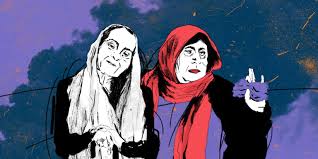Suweida, once a symbol of quiet resistance in Syria’s long war, has been plunged into terror and despair. What began as a sudden wave of sectarian violence has spiraled into what many fear is a campaign of annihilation. Entire neighborhoods lie in ruin. Families flee with only what they can carry—or stay and risk being slaughtered. In this shattered landscape, three stories emerge: a woman who faced a tank with nothing but her rifle; a son in exile who watched helplessly as his parents were nearly killed; and a city whose residents are betrayed, besieged, and crying out for help.
These aren’t just stories of suffering. They are testimonies of unimaginable cruelty and quiet, unshakable courage. From the bravery of Fawziya al-Shaarani, who stood her ground until the end, to the raw anguish of a son whose father was forced to howl under threat of death, to the chorus of voices documenting mass graves and state betrayal—these accounts capture both the horror and the dignity of a people abandoned, but not broken.
Suweida, once a refuge for those fleeing Assad’s army, is now a city drowning in corpses and screams. Entire families are huddled together in fear, bags packed for escape. Rami and his neighbors from a northern village fled under the threat of advancing tribal militias attacking from multiple fronts. Like thousands of others, they live in constant dread of being overrun—or erased.
Since the eruption of sectarian violence last Sunday, more than 80,000 families have fled toward the Jordanian border, including over a thousand Bedouin families. The Druze-majority city, home also to Christian and Bedouin minorities, is enduring its darkest days since the Syrian revolution began. But this time, many fear what’s unfolding is not just chaos—but a campaign of extermination.
Tamer, a university student turned village guard, says bluntly: “They want to kill us all.” After losing relatives to militia gunfire and witnessing brutal videos of executions, he joined the defense line. Inside the city, the terror is palpable. Mayson, hiding with her family, hears motorbikes and men shouting “Allahu Akbar” as unidentified fighters open fire in hit-and-run waves of intimidation.
From Germany, Nadia watches the nightmare unfold online. Her mother and brother were wounded when their home collapsed under shelling. She recalls the moment she thought her mother had died, buried in dust and silence. “That image never leaves me,” she says. “We’re being slaughtered—and no one cares.”
Nadia, like many Druze abroad, feels abandoned. “This is the final rupture between Druze and Sunnis, even with the idea of Syria itself,” she says. “How can I believe this army will ever protect us?”
She and others are scrambling to document the massacres and secure humanitarian access. “My only dream now,” she says bitterly, “is to get my family out—and cut all ties to this cursed land.”
The sense of betrayal runs deep. State media parrots government narratives and broadcasts conflicting reports, fueling confusion and eroding trust. Hind, a young Christian woman living abroad, says: “I stopped following Syrian news. Their voices are no different from the killers’.”
Meanwhile, residents like Raghdah huddle in narrow corridors with ten others, praying to survive. She learned of the deaths of thirteen family members in a single massacre—killed while gathered in a guesthouse. Her friend and her entire family were murdered and burned in their home. “I was hiding in a space barely bigger than a closet, while outside the city bled.”
Damascus insists its forces were merely quelling local unrest—but eyewitness accounts, video evidence, and testimonies say otherwise. President Ahmad al-Sharaa praised the tribal militias, thanking them for their “honourable role” in defending the state.
But the state and its allied militias stand accused of summary executions, torture, and horrific acts. One video showed three young men forced to jump from a balcony, only to be gunned down mid-air—recalling the infamous Tadamon massacre. Entire families—women, children, the elderly—have been slaughtered indiscriminately.
The humanitarian situation is catastrophic. Water is gone. Food is gone. Internet outages sever all connection with the outside world. Rami offers $50 for 25 liters of water—no one responds.
Hospitals are collapsing. With staff exhausted and supplies depleted, even basic wound care is a struggle. In some morgues, bodies are decaying. A doctor describes the hospital as “a cemetery without soil.” Surgical care is impossible except for the dying.
Suweida is no longer a city—it is a graveyard echoing with cries for help, unanswered.


